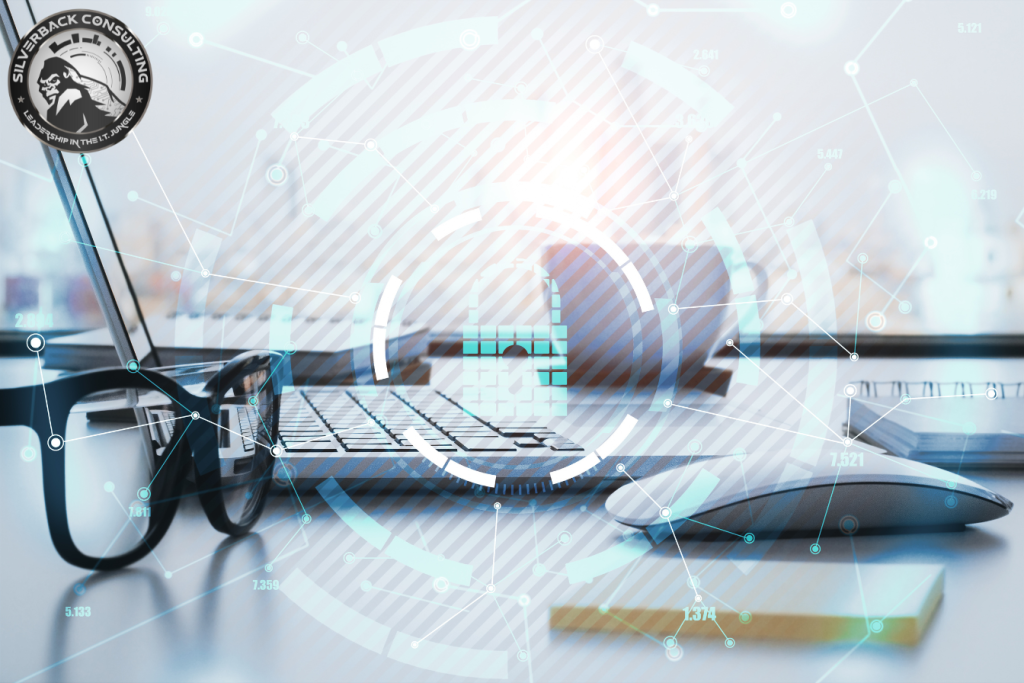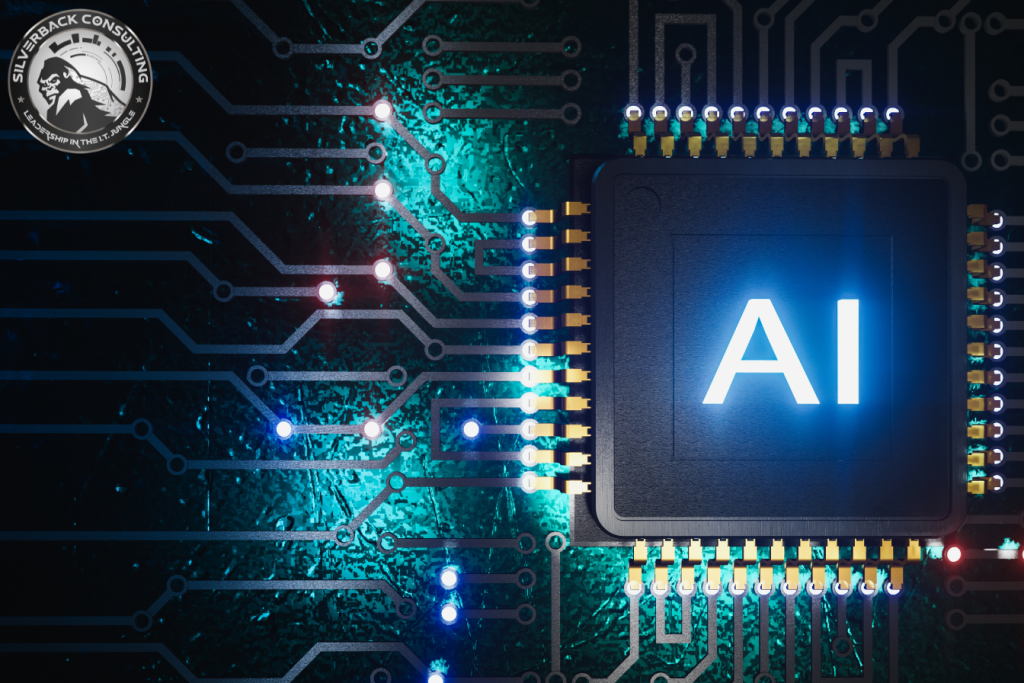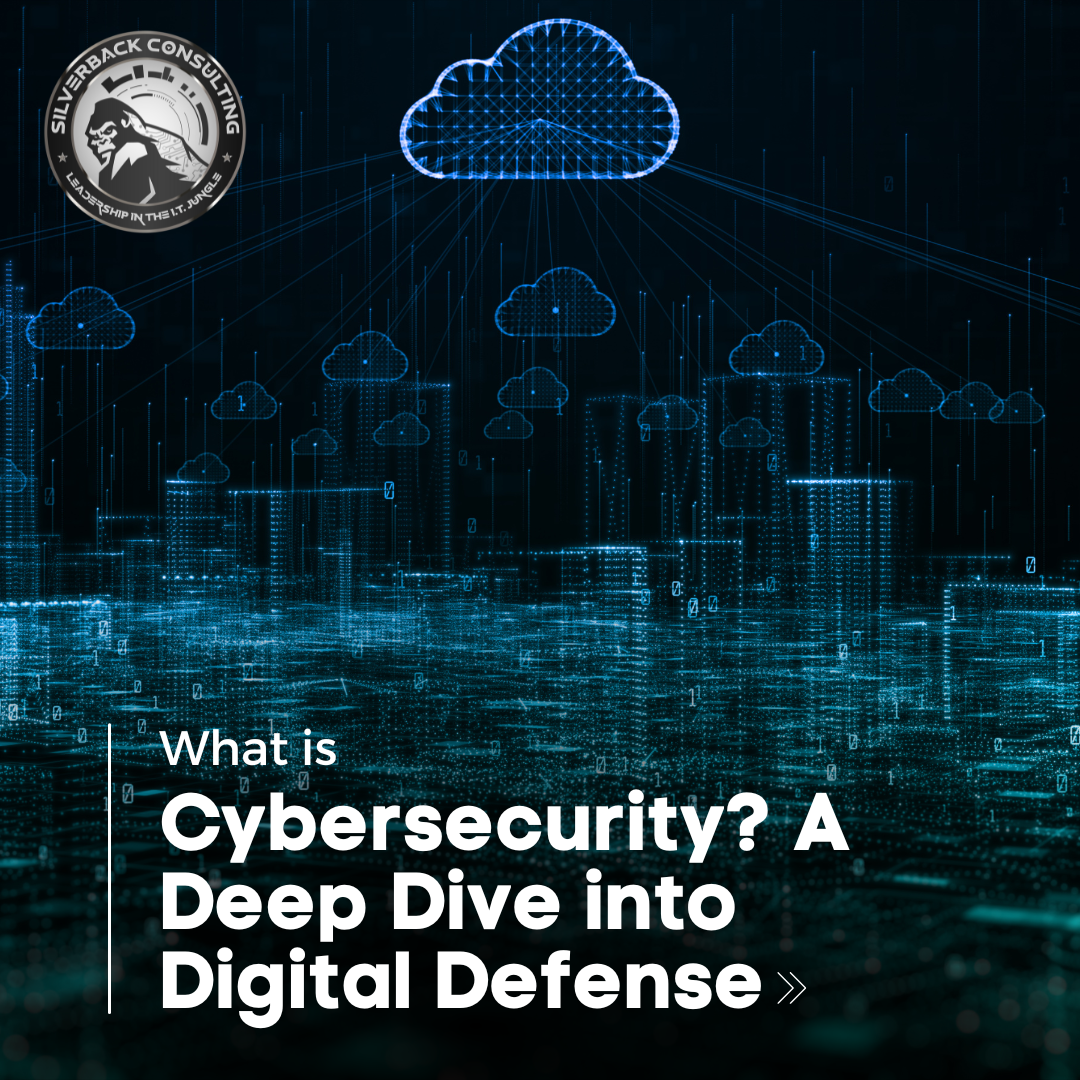Introduction
What is cybersecurity? At Silverback Consulting, we believe this is one of the most important questions facing modern organizations.
Whether you’re running a small business or leading a large enterprise, your data, systems, and reputation are constantly at risk. Understanding the foundations of cybersecurity isn’t just smart, it’s essential.
Defining Cybersecurity: The Digital Defense Layer

Cybersecurity is the practice of protecting your digital systems, networks, and data from unauthorized access, malicious attacks, and data breaches. It’s a broad field that encompasses everything from network security and encryption to user training.
In essence, cybersecurity safeguards the integrity, confidentiality, and availability of your digital assets.
At Silverback Consulting, we help organizations develop customized strategies to strengthen every layer of their digital infrastructure, because true security comes from a comprehensive approach.
Key components of cybersecurity include:
- Network security – protecting internal systems from unauthorized access and attacks
- Endpoint protection – securing individual devices like laptops, smartphones, and tablets
- Application security – identifying and fixing vulnerabilities in software and platforms
- Cloud security – managing access, visibility, and compliance in cloud environments
- Identity & access management (IAM) – ensuring only the right users have the right level of access
Cybersecurity isn’t a one-time project, it’s a continuous commitment.
Why Cybersecurity is Important?
Let’s be clear: if your business has an internet connection, it’s a potential target. Why is cybersecurity important? Because without it, you’re exposed to risks that could compromise your operations, finances, and brand reputation.
Cyberattacks are no longer just a concern for large enterprises. Today, small and mid-sized businesses are increasingly targeted because they’re often under-protected. Ransomware, phishing, DDoS attacks, insider threats—these are real and growing dangers.
Cybersecurity matters because:
- Data is a valuable asset – and it’s highly targeted by cybercriminals.
- Downtime is costly – even a few hours offline can result in lost revenue and customer trust.
- Compliance is non-negotiable – industries like healthcare, finance, and legal must meet strict security requirements.
- Reputation is everything – a single breach can tarnish a brand for years.
At Silverback Consulting, we don’t just protect businesses, we future-proof them against the evolving threat landscape.
Cybersecurity for Businesses: Risks and Realities

Cybersecurity for businesses means more than just installing antivirus software. It’s about building resilience, so your organization can prevent, detect, respond to, and recover from attacks effectively.
Today’s businesses face:
- Ransomware that encrypts critical systems until payment is made
- Phishing campaigns targeting employees and executives
- Credential theft from leaked or reused passwords
- Cloud misconfigurations exposing sensitive data
- Third-party vulnerabilities in the supply chain
A strong business cybersecurity strategy includes:
- Proactive risk assessments
- Implementation of multi-factor authentication (MFA)
- Use of endpoint detection and response (EDR) tools
- Security awareness training for employees
- Regular data backups and recovery planning
Silverback Consulting works alongside your internal team to identify gaps, reduce exposure, and build a culture of security from the inside out.
What Are Managed Security Services?
Not every organization has the resources to build an in-house cybersecurity team. That’s where Managed Security Services come in.
So, what are managed security services?
Managed Security Services Providers (MSSPs) like us here at Silverback Consulting deliver outsourced cybersecurity solutions, combining expert monitoring, detection, and response with advanced technologies and strategic guidance. We help businesses get enterprise-level protection without enterprise-level overhead.
Our services include:
- 24/7 monitoring and threat detection
- Incident response and remediation
- SIEM (Security Information and Event Management) integration
- Compliance management and reporting
- Vulnerability scanning and penetration testing
We operate as an extension of your team so you can focus on growing your business, not fighting cyber threats.
Generative AI in Cybersecurity: Smarter, Faster Defenses

AI is transforming cybersecurity, and Generative AI is leading the charge.
By analyzing massive datasets, identifying patterns, and even simulating threats, AI enables us to stay one step ahead of attackers.
At Silverback Consulting, we harness AI to:
- Identify abnormal behavior across networks in real time
- Automate threat analysis and response workflows
- Enhance phishing and malware detection models
- Simulate attacks to test system resilience
- Accelerate forensics and reporting after incidents
Generative AI is not replacing security professionals—it’s empowering them to make faster, smarter decisions.
Conclusion
At Silverback Consulting, we understand that cybersecurity isn’t just about protecting data, it’s about protecting what your business stands for.
From risk assessments to fully managed security services, we help organizations of all sizes stay one step ahead of attackers.
If you’re ready to take control of your cybersecurity strategy, we’re ready to help.
FAQS
Is cybersecurity a good career?
Absolutely. Cybersecurity offers job stability, high earning potential, and the opportunity to make a real impact. As threats grow, so does the demand for skilled professionals.
Which is easy: cybersecurity or artificial intelligence?
It depends on your interests. Cybersecurity is more systems and infrastructure-focused, while AI involves deep programming, math, and algorithms. Both require dedication.
How can generative AI be used in cybersecurity?
Generative AI can detect threats, simulate attacks, automate analysis, and improve threat-hunting efficiency, making security operations smarter and faster.
How to get into cybersecurity?
Start with IT basics, pursue industry certifications, gain hands-on experience, and explore specialized roles that match your interests.
Does cybersecurity require coding?
Not all roles require coding, but understanding scripting (Python, Bash) is useful especially for analysts, engineers, and penetration testers.
Ready to Strengthen Your Cybersecurity? Let’s Talk.
Protect your business from evolving threats with expert guidance and managed security services tailored to your needs. Fill out the form below or give us a call. We’re here to help!📞 Prefer to speak with someone now? Call us at (719) 452-2205
Silverback Consulting
303 South Santa Fe Ave
Pueblo, CO 81003
719-452-2205
support@silverbackconsulting.us
“Leadership in the I.T. Jungle”




